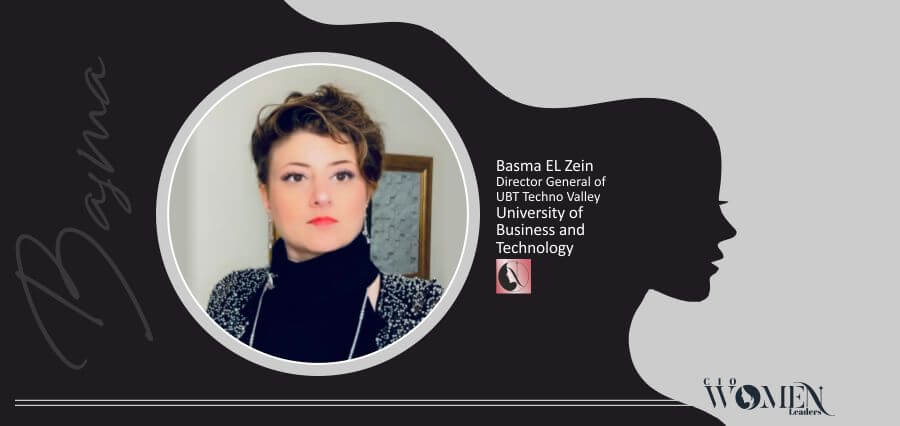Basma El Zein is a luminary in the landscape of sustainable development and cutting-edge research, steering the course of innovation with unparalleled expertise. As the Director General of UBT Techno Valley at the University of Business and Technology, Basma showcases coherence of strategic planning, implementation and management within the university’s innovation hub.
Basma’s journey into the realms of nanotechnology and renewable energy is nothing short of awe-inspiring. Her story unfolds with a fervent passion for science and technology, a passion that morphs into an unwavering commitment to revolutionizing the world through innovation. She wanted to be innovative and different.
Armed with a master’s in electrical and Electronics Engineering from the Lebanese University, Basma embarked on a global exploration of engineering perspectives, marking a pivotal moment at Oxford University in 2005, where the enchanting whispers of nanotechnology first reached her ears. Nanotechnology intrigued her sealing her fate in the field.
In 2007, Basma took a leap, publishing her inaugural paper on heat transfer in nano-transistors, a cornerstone in her journey into nanotechnology. A Ph.D. soon followed focusing on nanotechnology for photovoltaic applications, cementing her profound interest in energy conversion and storage.
Over two decades, Basma took up diverse roles, from a distinguished research scientist at KAUST to a visiting scholar in France, leaving an indelible mark on academic and research landscapes. Mentoring Ph.D. students, overseeing projects and judging on grand stages like Intel ISEF-USA reflect her commitment to fostering excellence.
Basma’s research orbits around eco-green solar cells, delving into materials like kesterite and perovskite. Her textbook, ‘Nanostructured Materials for Photovoltaic Applications,’ and edited book, ‘Novel ZnO-Based Nanostructures,’ attest to her influence. A patent, ‘ZnO Nanostructure by Low-Pressure Pulsed Laser Deposition,’ crowns her achievements in renewable energy.
Accolades follow, including recognition as ‘Women of Achievement in Energy by LEWAS’ and a special medal from the Harvard Business Council. Selected as a Solar Pioneer by MESIA, Basma’s impact is spotlighted globally.
Currently, her research bridges nanotechnology and climate change, aligning with the 17 SDGs. Addressing global challenges is her ongoing commitment encapsulating a journey marked by passion, dedication and a relentless pursuit of excellence.
From Curiosity to Creation
Basma shares her strategies for driving innovation within her team. “Encouraging a culture of curiosity is fundamental,” she asserts, emphasizing the importance of questioning norms and exploring new ideas. This, she believes, sparks creativity and motivates continuous exploration for innovative solutions.
Cross-disciplinary collaboration is another key principle Basma champions. Nanotechnology intersects with various fields, urging her team to engage with experts from diverse backgrounds for fresh perspectives. Allocating resources to research and development is crucial from securing funding to providing cutting-edge facilities ensuring the team stays ahead in the rapidly evolving nanotech landscape.
Continuous learning is a priority. Basma stresses ongoing training to keep the team updated with the latest advancements. “Innovation involves calculated risks,” she encourages, promoting a fearless approach and learning from failures. Open communication, a supportive environment and ethical considerations are also integral in fostering an atmosphere where ideas thrive.
Understanding market trends and collaborating with industry partners are strategic moves that align research with real-world needs. Basma’s long-term vision emphasizes sustainable and impactful innovations. “Our commitment to these principles shapes the future of nanotechnology,” she shares, making a positive impact on society through a culture of creativity, innovation and entrepreneurship.
Making a Difference
Basma champions a collaborative and interdisciplinary approach in the dynamic realm of nanotechnology and renewable energy, affirming, “Encouraging a culture of curiosity is fundamental.” In her role as a leader, she initiated ground-breaking Research Flagships, fostering collaboration across diverse sectors to meet the economic goals of Saudi Arabia’s Vision 2030. Each flagship, spanning fields from Agriculture to Entertainment, brought together varied academic backgrounds and amplified the power of diverse perspectives.
Basma’s Industry-University Relationship Program exemplifies a win-win scenario, addressing industry challenges through targeted research. “By collecting these challenges,” she says, “we structured research projects that directly addressed industry needs,” creating a synergy between academia and industry that benefits both.
Her commitment extends to fostering interdisciplinary spaces, organizing workshops and assembling diverse teams. “Effective communication is key,” Basma asserts, emphasizing the importance of clear communication to facilitate collaboration and comprehensive problem-solving.
The benefits of Basma’s interdisciplinary approach are palpable—comprehensive problem-solving, innovation, real-world relevance, and bridging the gap between academic knowledge and practical implementation. By championing collaboration and interdisciplinary research, Basma contributes to impactful solutions that address global challenges, aligning with her commitment to making a meaningful difference in the world.
Navigating Nanotechnology
Navigating the delicate balance between innovation and structure in nanotechnology, Basma advocates for a nuanced approach, stating, “I believe in establishing a strong ethical foundation for nanotechnology innovation.” Her strategy includes fostering responsible use, regulatory oversight and interdisciplinary collaboration to embed ethical and safety considerations in the innovation process. Safety protocols and rigorous enforcement in labs are non-negotiable to protect researchers and the environment, as she emphasizes, “Safety is a priority.”
Environmental impact assessments form a crucial part of Basma’s strategy, ensuring thorough evaluations before implementing nanotech innovations. Engaging with the public and stakeholders is paramount for balanced regulatory frameworks. Basma underscores transparency advocating for clear communication on nanotechnology benefits and risks. Education and training on ethical and safety considerations are prioritized.
In the global arena, Basma actively engages in international collaborations for policy development emphasizing support for responsible research. Nanotechnology’s impact on the UN’s 17 SDGs is evident, from poverty alleviation to sustainable cities, with Basma stating, “By adhering to these principles, we can foster innovation while ensuring that the field of nanotechnology grows sustainably and responsibly making a significant impact on the UN’s 17 SDGs and contributing to a more sustainable and peaceful future.” Her approach underscores the potential of nanotechnology to shape a sustainable and impactful future.
Leadership Begins with Example
In her leadership role in nanotechnology and renewable energy, Basma champions sustainability with a mission-driven approach, stating, “Leadership begins with setting a strong example.” She integrates sustainable practices into her work, showcasing their feasibility and benefits. Actively promoting a sustainability policy within her organization, Basma outlines a commitment to environmental, social and economic sustainability providing a decision-making framework.
Engaging stakeholders is crucial, with Basma emphasizing, “Encouraging open dialogue and feedback on sustainability initiatives ensures all perspectives are considered.” Education is key and she prioritizes workshops and ongoing learning to increase awareness. Project selection aligns with sustainable goals evaluating environmental impact, social responsibility and economic viability.
Basma underscores resource efficiency advocating for energy conservation, waste reduction and responsible resource management noting that efficiency benefits both the environment and cost savings. Her expertise in renewable energy translates into advocating for clean energy sources insisting on thorough environmental impact assessments before significant projects.
Supporting research focusing on sustainable solutions, eco-friendly materials and green nanotechnology applications is integral. Basma extends her commitment globally, engaging in collaborations to address sustainability challenges and contribute to a more sustainable future. For her, advocating sustainability is a mission with strategies that make a positive impact on the environment and society at large.
From Challenges to Breakthroughs
Navigating leadership, negotiations become a cornerstone, as Basma recounts a challenging experience forging a research partnership with an international organization in renewable energy. “Maintaining clear and well-defined objectives was integral,” she emphasizes, ensuring effective communication of goals. Actively listening to international partners’ concerns built trust, showcasing a commitment to mutual benefit. Cultural sensitivity plays a pivotal role in recognizing and respecting differences.
Identifying common ground, flexibility and trust-building formed the negotiation’s foundation. Leveraging expertise with technical insights demonstrated capabilities. Emphasizing a long-term vision and adopting a problem-solving approach, negotiations transformed challenges into opportunities for collaboration. Basma stresses the iterative nature of negotiations allowing time for reflection and adjustments.
The result was a successful research partnership yielding significant advancements in renewable energy. Basma’s patient, culturally sensitive and problem-solving approach bridged differences reinforcing the importance of effective negotiations in advancing their field. Through this experience, she highlights the power of collaboration and strategic negotiation in achieving common objectives.
Inspiring the Next Generation
Actively contributing to the scientific community, Basma engages in multifaceted roles, stating, “My commitment to advancing science and technology is exemplified by my role as a peer reviewer.” As a peer reviewer for prestigious journals and conferences, she upholds the quality and credibility of scientific publications by assessing and providing feedback on research papers and proposals.
Basma wholeheartedly embraces knowledge sharing, serving as a guest speaker at international conferences, actively mentoring Ph.D. students and collaborating on cutting-edge research projects. She affirms, “These endeavors not only bolster the scientific community but also nurture the next generation of scientists.” Beyond this, her leadership and editorial roles include being Co-editor-in-chief for the Distributed Generation and Alternative Energy Journal and contributing as an Editorial Board Member to esteemed journals.
A pivotal role in developing a Master’s program in Tolerance Studies and Global Peace reflects Basma’s dedication to advancing global peace through education. Serving as a member of the Jury for Ph.D. defenses and affiliations with numerous organizations further showcase her commitment to the field. Basma’s engagements resonate with a genuine passion for advancing knowledge providing intrinsic fulfillment rooted in the collective progress of the scientific community and meaningful connections.
Continuous Learning Catalyst
In the pursuit of balanced leadership and personal growth, Basma emphasizes the value of continuous learning and development, stating, “I have always recognized the significance of continuous learning throughout my leadership journey.” Her approach to self-investment and growth includes:
- Academic Pursuits: Basma believes in the power of education for the commitment to advanced degrees and academic research broadens her knowledge enabling effective mentorship.
- Professional Memberships: Actively participating in associations like IEEE and ACM keeps her connected, providing collaboration opportunities within a community valuing lifelong learning.
- Publication and Research: Publishing research papers and authoring books serves as continuous learning expanding her understanding and critical thinking.
- International Engagement: Engaging globally through collaborations and conferences enriches her leadership style with diverse perspectives and approaches.
- Mentorship and Teaching: Guiding Ph.D. students fosters a culture of shared learning, making mentorship a two-way learning process.
- Ethics and Sustainability: Basma invests time in understanding and advocating for responsible innovation, attending seminars dedicated to ethics and sustainability.
- Self-Reflection and Feedback: Regular self-reflection and seeking feedback identify areas for improvement, shaping an adaptable leadership style.
- Embracing Challenges: Viewing challenges as opportunities for growth cultivates resilience, whether in research or leadership.
- Balancing Work and Life: Recognizing the importance of work-life balance allows for personal time, crucial for well-being and personal growth.
- Staying Informed: Daily habits of staying informed about industry news and global issues ensure relevance and informed decision-making.
Basma’s commitment to continuous learning benefits not only her personal growth but also positively impacts the organizations and initiatives she leads, fostering innovation and excellence.
Young Minds, Big Impact
Basma reflects on a remarkable experience guiding students from the MAWHIBA program, stating, “The students I had the privilege to mentor displayed an extraordinary level of curiosity, determination and enthusiasm for research in the field of nanotechnology.” These students partaking in the Innovation and Creativity Olympiad showcased not only innovation but also the potential to address global challenges in nanotechnology and energy conversion.
As their mentor, Basma shares, “I guided them in refining their research methodologies, advised them on conducting experiments and provided insights into the latest developments in nanotechnology.” The journey proved transformative, emphasizing the boundless potential within young minds. The pinnacle of pride came as the students received accolades at local and international levels, with one earning a special prize at the Intel International Science and Engineering Fair for her research on nanomaterials in sewage water treatment.
This mentoring experience solidified Basma’s commitment to nurturing young talent, stating, “It reinforced my belief in the importance of providing them with the guidance and resources they need to excel.” It illuminated the potential of innovative minds in shaping the future of science and technology.
From Nanotechnology to Global Impact
Basma shares, “Throughout my career, I have been fortunate to engage in several collaborations with esteemed institutions and experts, some of which have indeed resulted in groundbreaking discoveries.”
She also adds, “These collaborative experiences have been invaluable and have taught me several significant lessons.” One standout collaboration involved merging expertise with a leading nanotechnology institution, resulting in a ground-breaking method to enhance solar cell efficiency. This breakthrough contributed to more effective and economical solar energy conversion.
Basma recounts another impactful collaboration with global renewable energy experts, expressing, “We joined forces to explore the application of nanomaterials in energy storage solutions.” This collaboration led to advanced energy storage systems with heightened performance and sustainability showcasing the power of international cooperation.
In her role overseeing international relations, Basma acknowledges, “I had the privilege of being in charge of international relations, which significantly contributed to the success of these collaborations.” These experiences underscore the vital role of global partnerships in fostering innovation, breaking down boundaries and enriching projects with diverse perspectives.
The lessons gleaned from these collaborations are diverse she emphasizes that collaboration is a catalyst for innovation bringing together varied expertise to tackle complex challenges. Effective communication, mutual respect and a shared vision emerge as key elements for success. These collaborative endeavors exemplify the driving force behind significant advancements in science and technology.
Innovating for Tomorrow
Looking ahead, Basma envisions her leadership as a force propelling nanotechnology and innovation into the future, stating, “I envision my leadership making substantial contributions in several significant ways.” These include:
- Advanced Research Initiatives: Basma pledges to lead and support advanced research initiatives in renewable energy, energy conversion and materials science. These initiatives aim to push the boundaries of nanotechnology, fostering cutting-edge technologies.
- Interdisciplinary Collaboration: Basma emphasizes her commitment to fostering interdisciplinary collaboration creating spaces for experts to exchange ideas and address global challenges collaboratively. This collaborative approach remains a cornerstone of her leadership.
- Ethical and Sustainable Nanotechnology: Basma is dedicated to promoting ethical and sustainable practices in nanotechnology emphasizing responsible use, regulatory oversight and, environmental impact assessments for environmentally responsible innovations.
- Education and Mentorship: Basma commits to nurturing the next generation of scientists through education and mentorship, aiming to inspire future leaders and innovators in nanotechnology.
- Global Engagement: Basma’s leadership will stay globally engaged, collaborating with institutions worldwide to address global challenges and drive international innovation.
- Promoting Peace and Tolerance: Building on her role in the Global Council for Tolerance and Peace, Basma will work to foster a culture of tolerance and peace through education and research.
- Policy and Regulation: Basma pledges active engagement in shaping policies and regulations governing nanotechnology ensuring safety, responsibility and alignment with global sustainability goals.
- Advancing UN Sustainable Development Goals: Basma focuses on integrating nanotechnology to address UN Sustainable Development Goals, particularly in clean energy, clean water, sustainable cities, and responsible consumption and production.
- Nanotechnology for Peace: Basma’s commitment to nanotechnology for peace remains integral to her leadership, working to promote peace through technological advancements and conflict resolution.
Basma’s vision for nanotechnology and innovation revolves around responsible leadership, collaboration, global engagement, and a commitment to ethical and sustainable practices, aiming to contribute to the well-being of the planet and its inhabitants.




